Culpepper's Dish

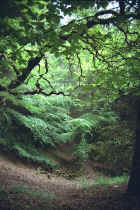 A sinkhole in the southern part of England,
110 miles west-southwest of London A sinkhole in the southern part of England,
110 miles west-southwest of London
Culpepper's Dish in Fiction
In the novel, The Return of the Native*, author Thomas Hardy places his
character Mrs. Wildeve at the lonely and desolate Culpepper's Dish to
collect holly branches for a wreath.

Culpepper's Dish according to Travel Books
From Portrait of Dorset
By Robert Hale, 1966
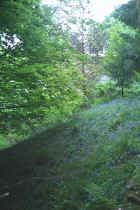 "The strange sands under these heaths (of East
Dorset) are sometimes capable of flowing like the material in an hour glass. I have seen
minor excavations tap running sand, which has flowed along with the stream covering the
neighboring meadows in inches of barren white sand which has buried the grass. "The strange sands under these heaths (of East
Dorset) are sometimes capable of flowing like the material in an hour glass. I have seen
minor excavations tap running sand, which has flowed along with the stream covering the
neighboring meadows in inches of barren white sand which has buried the grass.
"Similar, but underground, movement of sand has produced deep conical pits in the
heath ....
"Previously mention was made of running sand which could cause soil
subsidence. The western heaths at Puddletown, Affpuddle and Turnerspiddle have many
conical pits, some of which are so deep that full-sized trees, growing in the bottom, do
not reach the level of surrounding land.
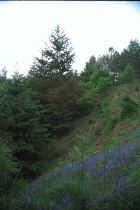 "The most famous is Culpeppers Dish by the
roadside on Briantspuddle Heath. This deep pit, similar to a volcanic cone, is alleged to
be named after Culpepper [Nicholas
Culpeper], the famous herbalist. With its tree in the middle it represented,
presumably, a vast pestle and mortar. "The most famous is Culpeppers Dish by the
roadside on Briantspuddle Heath. This deep pit, similar to a volcanic cone, is alleged to
be named after Culpepper [Nicholas
Culpeper], the famous herbalist. With its tree in the middle it represented,
presumably, a vast pestle and mortar.
"Local legends attribute the pits to the devil; learned men of
Victorian days had theories of temples from prehistoric times. Two of the difficulties of
explaining them in terms of human activity are the absence of banks of spoil, and the fact
that there is no sign of any sort of track from the bottom to the top.
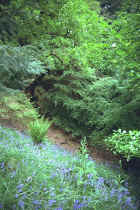 "We have circular pits in chalk fields of similar depth
but there is always a winding path up which donkeys with panniers brought the chalk to
spread it over the fields. The heath pits are perfectly conical. Without much doubt their
formation is natural, although it is possible for those who like mysteries to consider
visitors from outer space... I think they are due to an underground stream tapping a layer
of running sand. The subsidence is very much the shape of an eddy of running water, and
when sand flows it behaves very like moving water." "We have circular pits in chalk fields of similar depth
but there is always a winding path up which donkeys with panniers brought the chalk to
spread it over the fields. The heath pits are perfectly conical. Without much doubt their
formation is natural, although it is possible for those who like mysteries to consider
visitors from outer space... I think they are due to an underground stream tapping a layer
of running sand. The subsidence is very much the shape of an eddy of running water, and
when sand flows it behaves very like moving water."

From Affpuddle
by Joan Brocklebank (1968)
 "The
heathlands of the parish were, until mid-nineteenth century a most important part of the
economy, infiltrating into every department of life. Geologically, they belong in the same
category as the wide stretch of the New Forest and the pine woods of Bournemouth and
Poole, being a long arm extended westwards from those regions. "The
heathlands of the parish were, until mid-nineteenth century a most important part of the
economy, infiltrating into every department of life. Geologically, they belong in the same
category as the wide stretch of the New Forest and the pine woods of Bournemouth and
Poole, being a long arm extended westwards from those regions.
The road along the heath passes Culpepers Dish, that astonishing, huge
hole in the ground, which now of necessity is to have red sparklers along its curve to
warn motorists not to plunge into its depths. Opposite the Dish there is to be a
water-reservoir for the Atomic Station, now in the ugly process of being built."
Culpepper Connections! Publisher's Note: Winfrith
nuclear power station (as it came to be called) has come and gone, and is in mothballs.
It's now an industrial estate - mostly R&D outfits. The pigs pictured at the
above right were found near the dish.

According to the British Ordnance Survey Map 194:
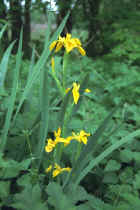 "Briantspuddle: 9m E of Dorchester. (Dorchester is due N
of Weymouth on the coast, which, in turn, is W of the Isle of Wight.) "Briantspuddle: 9m E of Dorchester. (Dorchester is due N
of Weymouth on the coast, which, in turn, is W of the Isle of Wight.)
Old-world village consisting of dumpy white-walled thatched cottages set in an idyllic
rural landscape beside the lazy River Piddle... Note the strange hole known locally as Cull-peppers
Dish. This deep, tree-filled pit is a splendid example of what geologists term a
swallow hole, and is caused by subsidence in the chalk below the gravel subsoil."
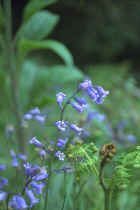 "This
walk over country much loved by T.E. Lawrence in the closing years of his life, gives a
variety of scenery -- woodland, field and heathland and pleasant riverside views. In
spring there are bluebells (pictured at right) and anemones, followed by wild
rhododendrons and, in late summer, the heather is in flower everywhere. The gradients are
easy but there is some difficult walking on the edge of Bovington’s tank training
area and later over rough ground which may be boggy. The best view point is from the car
park, looking south over descending woods to high ground beyond..." "This
walk over country much loved by T.E. Lawrence in the closing years of his life, gives a
variety of scenery -- woodland, field and heathland and pleasant riverside views. In
spring there are bluebells (pictured at right) and anemones, followed by wild
rhododendrons and, in late summer, the heather is in flower everywhere. The gradients are
easy but there is some difficult walking on the edge of Bovington’s tank training
area and later over rough ground which may be boggy. The best view point is from the car
park, looking south over descending woods to high ground beyond..."
T.E. Lawrence (of Arabia)’s cottage is to the southeast of Culpeppers Dish
and his grave site is to the southwest.
* Synopsis of The Return of the Native, from its Publisher, Viking Pen:
[The] novel sets in opposition two of Thomas Hardy's most unforgettable creations: his
heroine, the sensuous, free-spirited Eustacia Vye, and the solemn, majestic stretch of
upland in Dorsetshire he called Egdon Heath. The famous opening reveals the haunting power
of that dark, forbidding moon where proud Eustacia fervently awaits a clandestine meeting
with her lover, Damon Wildeve. But Eustacia's dreams of escape are not to be
realized--neither Wildeve nor the retuming native Clym Yeobright can bring her salvation.
Injured by forces beyond their control, Hardy's characters struggle vainly in the net of
destiny. In the end, only the face of the lonely heath remains untouched by fate in
this masterpiece of tragic passion, a tale that perfectly epitomizes the author's own
unique and melancholy genius. (The book is available by on-line order at
barnesandnoble.com.)
(Thomas Hardy was also the author of Tess of the D'Urbervilles; Jude the
Obscure; and Far from the Madding Crowd.)

 Sources Sources
The above texts and map were provided by Brenda Culpepper, Chip
Culpepper and Cathy Griffin. The photographs and current
information about the area were provided courtesy of Lewis Williams (pictured
at the right), of Poole, Dorsetshire. He provided Culpepper Connections!
with an impressive audio-video slide show, of his bicycle trip to Briantspuddle and hike
down into the Dish.
Last Revised:
02 Jan 2015
|